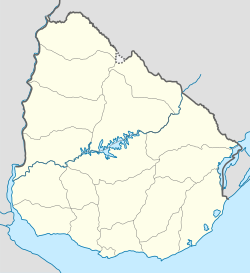José Enrique Rodó, Uruguay
José Enrique Rodó | |
|---|---|
Town | |
 | |
| Coordinates: 33°42′0″S 57°32′0″W / 33.70000°S 57.53333°W | |
| Country | |
| Department | Soriano Department |
| Population (2011) | |
• Total | 2,120 |
| Time zone | UTC -3 |
| Postal code | 75202 |
| Dial plan | +598 4538 (+4 digits) |
José Enrique Rodó is a small town in the Soriano Department of western Uruguay.
Geography
[edit]The town is located on Route 2, about 26 kilometres (16 mi) northwest of Cardona and 70 kilometres (43 mi) southeast of the city of Mercedes.
History
[edit]By the late 19th century, there existed a precarious slum called Drovandi Town, after the family surname that owned the fields. The San José-Mercedes railway was inaugurated in 1901, and along with it, the Drabble Station, named after George Drabble, a British businessman who invested in railway development in Uruguay and Argentina. By the 30s essential services were inaugurated. Between 1963 and 1996 the population increased by 40%.
On 12 June 1924, the populated centre was declared a "Pueblo" (village) by the Act of Ley N° 7.729, and changed its name to José Enrique Rodó, an Uruguayan writer who died in 1917. Previously, it had been head of the judicial sections "San Martin" and "Costa Durazno".[1] On 17 November 1964, its status was elevated to "Villa" (town) by the Act of Ley N° 13.299.[2]
Population
[edit]In 2011 José Enrique Rodó had a population of 2,120.[3]
| Year | Population |
|---|---|
| 1908 | 3,113 |
| 1963 | 1,319 |
| 1975 | 1,788 |
| 1985 | 1,661 |
| 1996 | 1,853 |
| 2004 | 2,113 |
| 2011 | 2,120 |
Source: Instituto Nacional de Estadística de Uruguay[1]
Places of worship
[edit]References
[edit]- ^ a b "Statistics of urban localities (1908–2004)" (PDF). INE. 2012. Retrieved 5 September 2012.[permanent dead link]
- ^ "LEY N° 13.299". República Oriental del Uruguay, Poder Legislativo. 1964. Archived from the original on 6 October 2014. Retrieved 5 September 2012.
- ^ "Censos 2011 Cuadros Soriano". INE. 2012. Archived from the original on 10 October 2012. Retrieved 25 August 2012.
External links
[edit]


